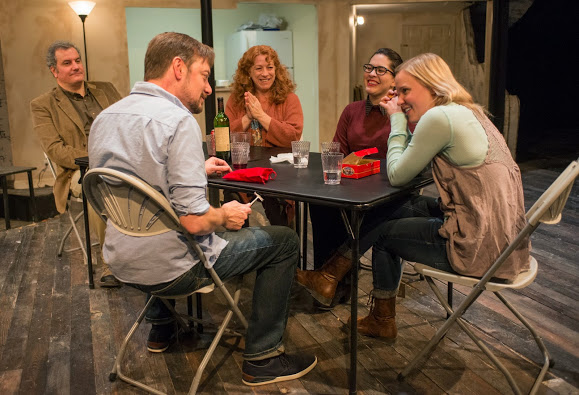'The Humans' Spills Emotion Around The Dinner Table
By Melody Udell in Arts & Entertainment on Nov 21, 2014 10:05PM

'The Humans' at the American Theater Company.
This Thanksgiving, you might want to spend a little time with the Blake family. In American Theater Company's The Humans, playwright Stephen Karam bring us an Irish Catholic, working class family with sweet family traditions interspersed with a fair share of family dysfunction. And despite issues that plague many modern-day families—debt, unemployment, chronic health conditions—the Blakes’ story, in the capable hands of director PJ Paparelli, manages to be both intimate and wide-reaching.
The play's staunch adherence to a relatable American family coming together for such a relatable American tradition—Thanksgiving dinner—is the heart of the play. The Blakes are brought together by the youngest daughter, Brigid (Kelly O’Sullivan), a struggling musician who bartends at night to pay her student debt. (A fact she doesn’t hesitate to remind her parents.) Regardless of their inability to pay her tuition, she’s happy to have her parents, Erik (Keith Kupferer) and Deirdre (Hanna Dworkin) come visit her new apartment, a dilapidated, ground-level duplex in New York’s Chinatown that she shares with her much older, trust-fund-type boyfriend, Richard (Lance Baker). Joining them are Brigid’s sister, Aimee (Sadieh Rifai), a lawyer going through the double trauma of a terrible breakup and an unrelenting health condition. Then there’s “Momo” (Jean Moran), the family matriarch suffering with Alzheimer’s.
Only 90 minutes long, the play still contains enough emotion to pack a full-scale production. The dinner starts out as so many family dinners do: With the parental figures assessing their child’s safety in the big city but also praising her new, metropolitan life. Erik and Dierdre, as depicted by Karam, portray the sort of American-dream-chasing, suburban parents that, today, are the antithesis of the lives led by their children. And luckily, Brigid and Aimee aren’t token millennials—they’re filled with their own individual nuances that help steer their characters away from sweeping generational stereotypes.
As the dinner goes on and toasts are proclaimed, Karam drills down into the family dynamic, which seems rock solid in some areas, but in others, it’s near crumbling. Brigid, perhaps under the stress of hosting her family for Thanksgiving, is one of the first to crack, making increasingly mean quips toward her mom. From there, the rest of the family begins to devolve, pausing mid-argument only when the eerie upstairs neighbor stomps loudly across her living room.
The Humans, which will move to New York’s Roundabout Theatre Company next fall, is not plot-driven. In fact, unearthing family-drama-bred insights and inner demons takes precedence over surprise twists and turns. But perhaps the most succinct summary of the play came from a theater-goer sitting next to me on press night, who turned to her daughter after curtain call and said, “That’s why we don’t do Thanksgiving with your dad’s family.” Fitting, although I hope they aren't missing out on the special kind of family bond that can only be shared through dysfunction.
The show runs through Sunday, Dec. 21 at the American Theater Co., 1909 W. Byron, 773-409-4125 or online.